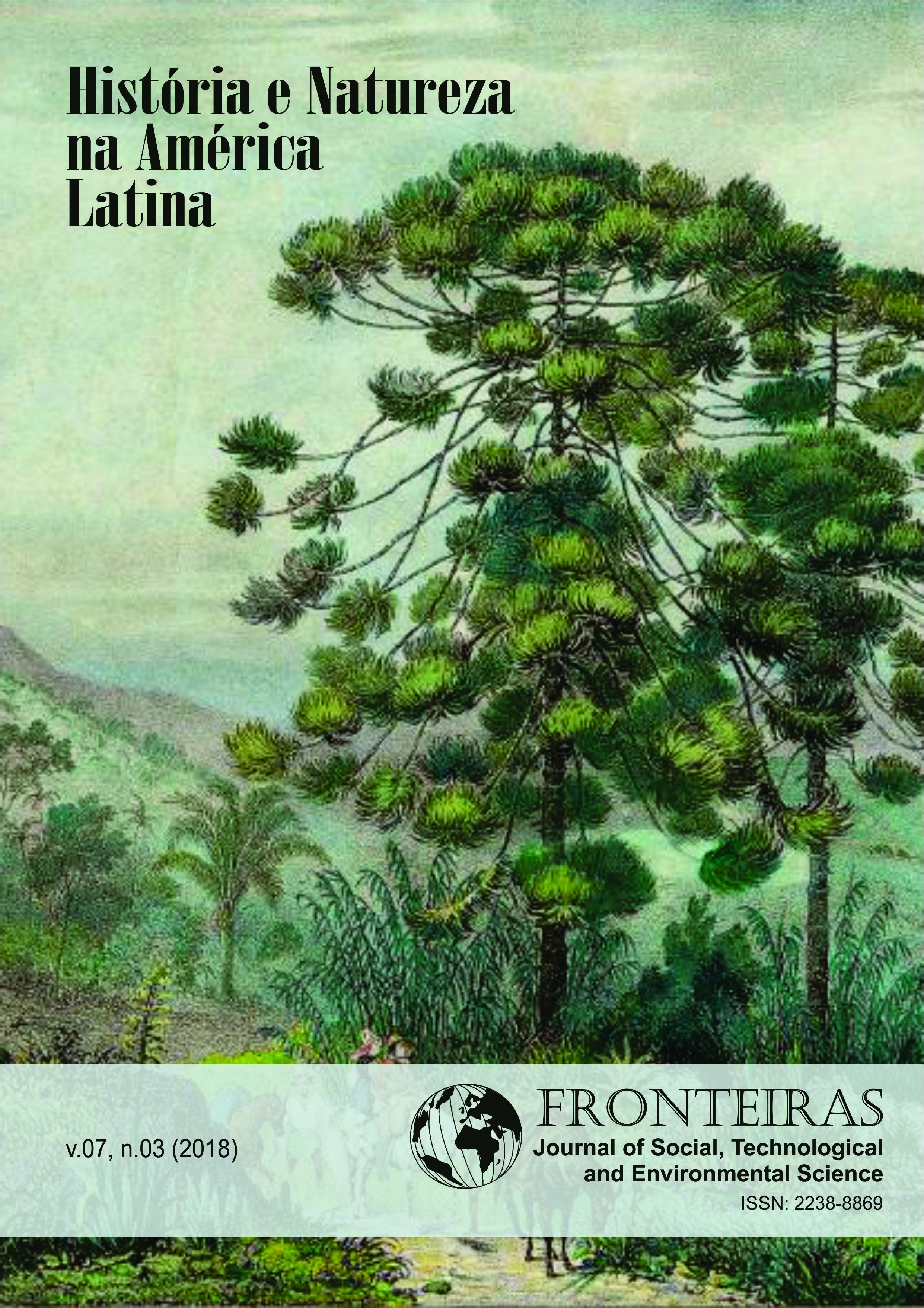An Appraisal of Environmental Microhistory: Epistemological and Historiographical Insights
DOI:
https://doi.org/10.21664/2238-8869.2018v7i3.p262-274Palavras-chave:
Micro-História, História Ambiental, Paradigma IndiciárioResumo
O desenvolvimento recente da história ambiental tem sido acompanhado por tentativas de combiná-la com a abordagem micro-histórica, aprimorando a compreensão de eventos específicos do passado e apontando para insights históricos relevantes em nível “macro”, que podem melhor informar debates contemporâneos orientados à elaboração de políticas públicas ambientais. Assim, o artigo apresenta aspectos da epistemologia e da historiografia da micro-história, enfatizando sua base no paradigma indiciário tal como apresentado pelo micro-historiador italiano Carlo Ginzburg, sua ênfase em contextos, relações e conexões, e seu potencial para revelar novas informações em nível “macro”. Afirma-se que essas características tornam a abordagem micro-histórica uma ferramenta metodológica adequada para a história ambiental, antecipando um futuro próspero para a micro-história ambiental.
Referências
Arndt M. Environmental History. Docupedia-Zeitgeschichte [serial on the internet]. 2016 Aug [cited 2017 Jun 20]; 25 p. Available from: http://docupedia.de/zg/Arndt_environmental_history_v3_en_2016
Beach CJW 1998. Beneath the waters: a microhistory of Ootsa Lake, a northern Eurocanadian community, MA Dissertation, University of Northern British Columbia, Prince George, 149 pp.
Benjamin W 1999. The Arcades Project, The Belknap Press of Harvard University Press, Cambridge, 1088 pp.
Bonnell JL 2010. Imagined futures and unintended consequences: an environmental history of Toronto’s Don River Valley, PhD Thesis, University of Toronto, Toronto, 405 pp.
Braudel F 1980. On History, The University of Chicago Press, Chicago, 236 pp.
De Certeau M 1992. The Writing of History, Columbia University Press, New York, 368 pp.
De Certeau M 2000. The Possession at Loudun, The University of Chicago Press, Chicago, 266 pp.
Douki C, Minard P 2007. Global history, connected histories: a shift of historiographical scale? Rev Hist Mod Contemp 54(4bis): 7-21.
Epple A 2012. The Global, the Transnational and the Subaltern: the limits of history beyond the national paradigm. In A Amelina, DD Nergiz, T Faist, NG Schiller, Beyond Methodological Nationalism, Routledge, New York, p. 241-276.
Epple A 2012a. Globale Mikrogeschichte: auf dem Weg zu einer Geschichte der Relationen. In E Hiebl, E Langthaler, Im Kleinen das Große suchen: Mikrogeschichte in Theorie und Praxis, Hans Haas zum 70. Geburtstag, Studien Verlag, Innsbruck, p. 37-47.
Ginzburg C 1979. Clues: roots of a scientific paradigm. Theory Soc 7(3): 273-288.
Ginzburg C 1980. The cheese and the worms: the cosmos of a sixteenth-century miller, The Johns Hopkins University Press, Baltimore, 177 pp.
Ginzburg C 1989. Mitos, emblemas, sinais: morfologia e história, 2nd Ed., Companhia das Letras, São Paulo, 288 pp.
Ginzburg C 1991. Checking the evidence: the judge and the historian. Crit Inquiry 18(1): 79-92.
Ginzburg C 1993. Microhistory: two or three things that I know about it. Crit Inquiry 20(1): 10-35.
Levi G 1991. On microhistory. In P Burke, New Perspectives on Historical Writing, Polity Press, Cambridge, p. 93-113.
Magnússon SG 2003. The singularization of history: social history and microhistory within the postmodern state of knowledge. J Soc Hist, 36(3): 701-735.
McNeill JR 2003. Observations on the nature and culture of environmental history. Hist Theory 42(4): 5-43.
Neves GP 2011. História, teoria e variações, Contracapa, Rio de Janeiro, 328 pp.
Peltonen M 2001. Clues, margins and monads: the micro-macro link in historical research. Hist Theory 40: 347-359.
Petrić H 2004. Environmental micro-history of a multiple borderland: Podravina’s Torčec in the second half of the 18th century. Podravina 3(6): 63-70.
Quadrelli A, Cardoso MHCA, Castiel LD 2014. On the indiciary nature of the clinical method: an anthropological view of a published case study. Salud Colect 10(2): 157-169.
Revel J 2010. Micro-história, macro-história: o que as variações de escala ajudam a pensar em um mundo globalizado. Rev Bras Educ 15(45): 434-444.
Roberts SE 2010. Pines, profits, and popular politics: responses to the White Pine Acts in the colonial Connecticut River Valley. N Engl Q 83(1): 73-101.
Rosenthal G 2017. A storm in Sāmoa: an environmental microhistory. Rethink Hist 21(1): 2-27.
Sandwell RW 2009. History as experiment: microhistory and environmental history. In A MacEachern, WJ Turkel, Method and Meaning in Canadian Environmental History, Nelson, Toronto, p. 124-138.
Scoones I 1999. New ecology and the social sciences: what prospects for a fruitful engagement? Annu Rev Anthropol 28: 479-507.
Sodikoff G 2007. An exceptional strike: a micro-history of 'people versus park' in Madagascar. J Political Ecol 14: 10-33.
Szijártó IM 2016. The capacities of microhistory. Ethnog Folk Carpath 19: 191-197.
Worster D 1988. The ends of the earth: perspectives on modern environmental history, Cambridge University Press, New York, 348 pp.
Downloads
Publicado
Como Citar
Edição
Seção
Licença
Esta revista oferece acesso livre imediato ao seu conteúdo, seguindo o princípio de que disponibilizar gratuitamente o conhecimento científico ao público proporciona maior democratização mundial do conhecimento.
A partir da publicação realizada na revista os autores possuem copyright e direitos de publicação de seus artigos sem restrições.
A Revista Fronteiras: Journal of Social, Technological and Environmental Science segue os preceitos legais da licença Creative Commons - Atribuição-NãoComercial 4.0 Internacional.


